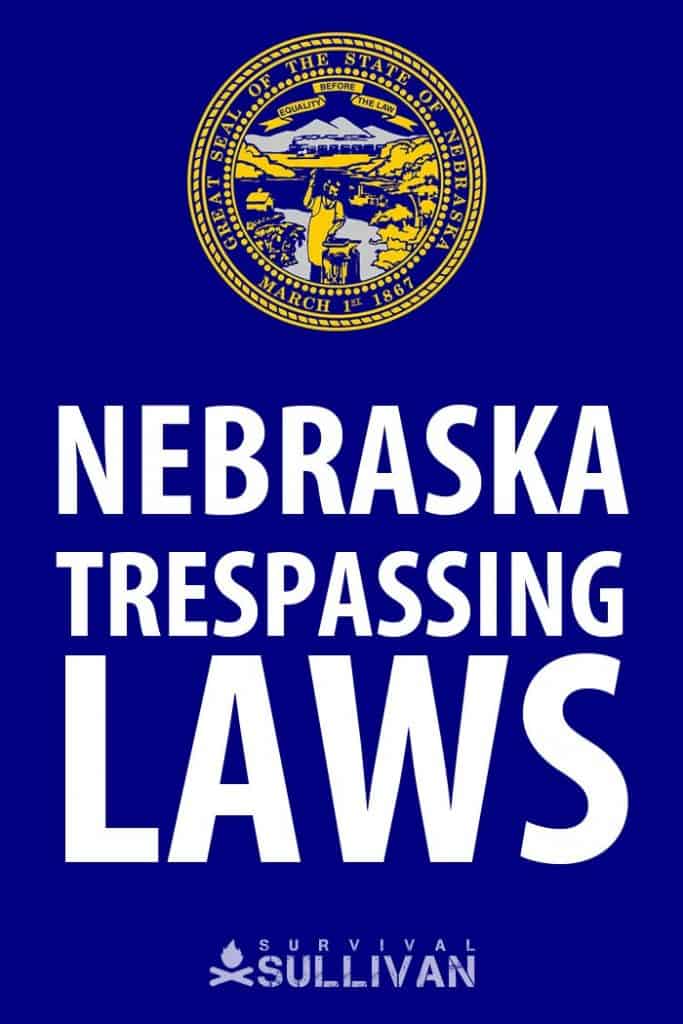Nebraska: Fast Facts on Trespassing
- Trespass Law Covers: Buildings, Dwellings, Land
- Crime Class: Misdemeanor
- Fencing Required?: No, but crossing an enclosed property does qualify certain charges.
- Signage Required?: No, but crossing an enclosed property does qualify certain charges.
- Verbal Notice Required?: No, but does count as notice against trespassing.

Nebraska Trespassing Law Overview
Nebraska is a state with relatively sparse laws covering trespassing. The laws make no mention of trespassing against vehicles, and barely any mention of trespassing on land. Only buildings and property in general are specifically named within the statutes.
Even so, Nebraska’s laws are easy to understand, if comparatively vague, and are constrained to a handful of short sections.
I will also be covering criminal mischief in Nebraska since, based on the way the laws are written, it would be an easy thing to be charged with criminal mischief even while committing simple trespass.
Relevant Nebraska State Statutes
- 28-519. Criminal mischief; penalty
- 28-520. Criminal trespass, first degree; penalty
- 28-521 Criminal trespass, second degree; penalty
- 28-522 Criminal trespass; affirmative defenses
Nebraska omits the section on definitions that many other states have at the beginning all chapters in their state statutes.
Definitions are also very few and far between throughout the body of the text. For that reason we are left to assume that any words have their common meaning, or any meaning that has been assigned to them through legal precedent in the state.
We begin with 28-519, criminal mischief:
28-519. Criminal mischief; penalty.
(1) A person commits criminal mischief if he or she:
(a) Damages property of another intentionally or recklessly; or
(b) Intentionally tampers with property of another so as to endanger person or property; or
(c) Intentionally or maliciously causes another to suffer pecuniary loss by deception or threat.
(2) Criminal mischief is a Class IV felony if the actor intentionally or maliciously causes pecuniary loss of five thousand dollars or more, or a substantial interruption or impairment of public communication, transportation, supply of water, gas, or power, or other public service.
(3) Criminal mischief is a Class I misdemeanor if the actor intentionally or maliciously causes pecuniary loss of one thousand five hundred dollars or more but less than five thousand dollars.
(4) Criminal mischief is a Class II misdemeanor if the actor intentionally or maliciously causes pecuniary loss of five hundred dollars or more but less than one thousand five hundred dollars.
(5) Criminal mischief is a Class III misdemeanor if the actor intentionally, maliciously, or recklessly causes pecuniary loss in an amount of less than five hundred dollars, or if his or her action results in no pecuniary loss.
The only reason I included criminal mischief in this brief on trespass laws for the state is specifically for paragraph 1 subsections (b) and (c).
It would be an easy thing to construe trespassing as deceptive, and deception that could potentially endanger someone else, or deprive them monetarily.
Better safe than sorry; you can still rack up a class 3 or even a Class 2 misdemeanor for you, and that penalty gets worse and worse the more damage or pecuniary loss that the prosecution can prove.
Moving swiftly along into the next section, and the first one covering the trespass law properly, we come to 28-520 which covers criminal trespass in the first degree, and its associated penalty:
28-520. Criminal trespass, first degree; penalty.
(1) A person commits first degree criminal trespass if:
(a) He or she enters or secretly remains in any building or occupied structure, or any separately secured or occupied portion thereof, knowing that he or she is not licensed or privileged to do so; or
(b) He or she enters or remains in or on a public power infrastructure facility knowing that he or she does not have the consent of a person who has the right to give consent to be in or on the facility.
(2) First degree criminal trespass is a Class I misdemeanor.
(3) For purposes of this section, public power infrastructure facility means a power plant, an electrical station or substation, or any other facility which is used by a public power supplier as defined in section 70-2103 to support the generation, transmission, or distribution of electricity and which is surrounded by a fence or is otherwise enclosed.
This is just about as simple as it gets when it comes to trespass laws. First degree criminal trespass is the secret entering of any occupied building, or any separately secured portion thereof, while knowing that you do not have the legal privilege to do so.
Note that the statute very specifically says occupied. Secretly entering or meaning behind in an unoccupied building is not first degree criminal trespass.
Alternately, entering or remaining in any public power infrastructure facility knowing that you do not have the right for permission for many people in charge. Doing either is a Class 1 misdemeanor in the state of Nebraska.
Next up we have 28-521 which covers criminal trespass in the second degree:
28-521. Criminal trespass, second degree; penalty.
(1) A person commits second degree criminal trespass if, knowing that he or she is not licensed or privileged to do so, he or she enters or remains in any place as to which notice against trespass is given by:
(a) Actual communication to the actor; or
(b) Posting in a manner prescribed by law or reasonably likely to come to the attention of intruders; or
(c) Fencing or other enclosure manifestly designed to exclude intruders except as otherwise provided in section 28-520.
(2) Second degree criminal trespass is a Class III misdemeanor, except as provided for in subsection (3) of this section.
(3) Second degree criminal trespass is a Class II misdemeanor if the offender defies an order to leave personally communicated to him or her by the owner of the premises or other authorized person.
Another simple, short section.
Second degree criminal trespass is committed when a person enters any place or property they know they do not have a right to be when notice against trespassing has been given to them specifically, verbally or by written instruction…
… or when there is a posted notice against such trespassing, or when there is fencing or some other kind of barricade or barrier that encloses the property, and is reasonably likely to exclude intruders of any kind.
If convicted of the charge of second degree criminal trespass you’ll be tagged with a class 3 misdemeanor, but it will be upgraded to a class 2 misdemeanor if you defied an order to leave a place personally communicated to you by the owner of the premises or one of their authorized agents.
The next section covers affirmative defenses to trespassing. There are only a few of them you need to be aware of:
28-522. Criminal trespass; affirmative defenses.
It is an affirmative defense to prosecution under sections 28-520 and 28-521 that:
(1) A building or occupied structure involved in an offense under section 28-520 was abandoned; or
(2) The premises were at the time open to members of the public and the actor complied with all lawful conditions imposed on access to or remaining in the premises; or
(3) The actor reasonably believed that the owner of the premises or other person empowered to license access thereto would have licensed him to enter or remain; or
(4) The actor was in the process of navigating or attempting to navigate with a nonpowered vessel any stream or river in this state and found it necessary to portage or otherwise transport the vessel around any fence or obstructions in such stream or river.
Like I said, there are not many. If you are entering a building which is abandoned, and abandoned does not simply mean unoccupied, for the record, you cannot be charged with trespassing.
Additionally, if a person is on any property or premises and believes that the owner of the premises or any of the owners’ agents would give them legal permission to enter or remain upon the property and this can be proven in court the charges will be dropped.
Lastly, if you are traveling across someone’s property via waterway in a non-powered vessel and have to hoof your vessel overland to bypass an obstruction in the waterway that is an affirmative defense to trespassing, and being an affirmative defense will still have to be proven in court.
In general, affirmative defenses sound great on paper but they do not drop or protect you from any charges at the time.
You will still have to go to court and argue as much and that is something you definitely don’t want to do. Hope that you never have to put any of these defenses to the test!
Conclusion
Nebraska trespassing laws are short and sweet, but fairly vague. No mention is given of vehicles and the specifics of what constitutes a property or premises is likewise lacking.
Even so, considering that they’re trespassing laws are hardly far-reaching you are unlikely to run into trouble so long as you stay off of other people’s property and obey the law.
How to Obtain a Trespassing Order in Nebraska
You can get an order of no trespass against anyone who enters or remains upon any of your property that they are not licensed or privileged to enter. Note that the severity of the crime in Nebraska depends on where and how a person trespasses, and trespassing in defiance of posted signage makes the crime significantly worse.
In any case, contact your local police department, orr sheriff’s office for info on the process and required forms for filing to obtain an order of no trespass.
Rules for Posting No-Trespassing Signs in Nebraska
Nebraska does not have any specific requirements concerning what trespassing signs have to look like or what they have to say. Accordingly, you can use any typical no-trespassing side, but I would advise you to make sure it is large, highly visible and posted at all probable entrances to your property.


Tom Marlowe practically grew up with a gun in his hand, and has held all kinds of jobs in the gun industry: range safety, sales, instruction and consulting, Tom has the experience to help civilian shooters figure out what will work best for them.

Can a person ride an ATV in the Little Blue River.